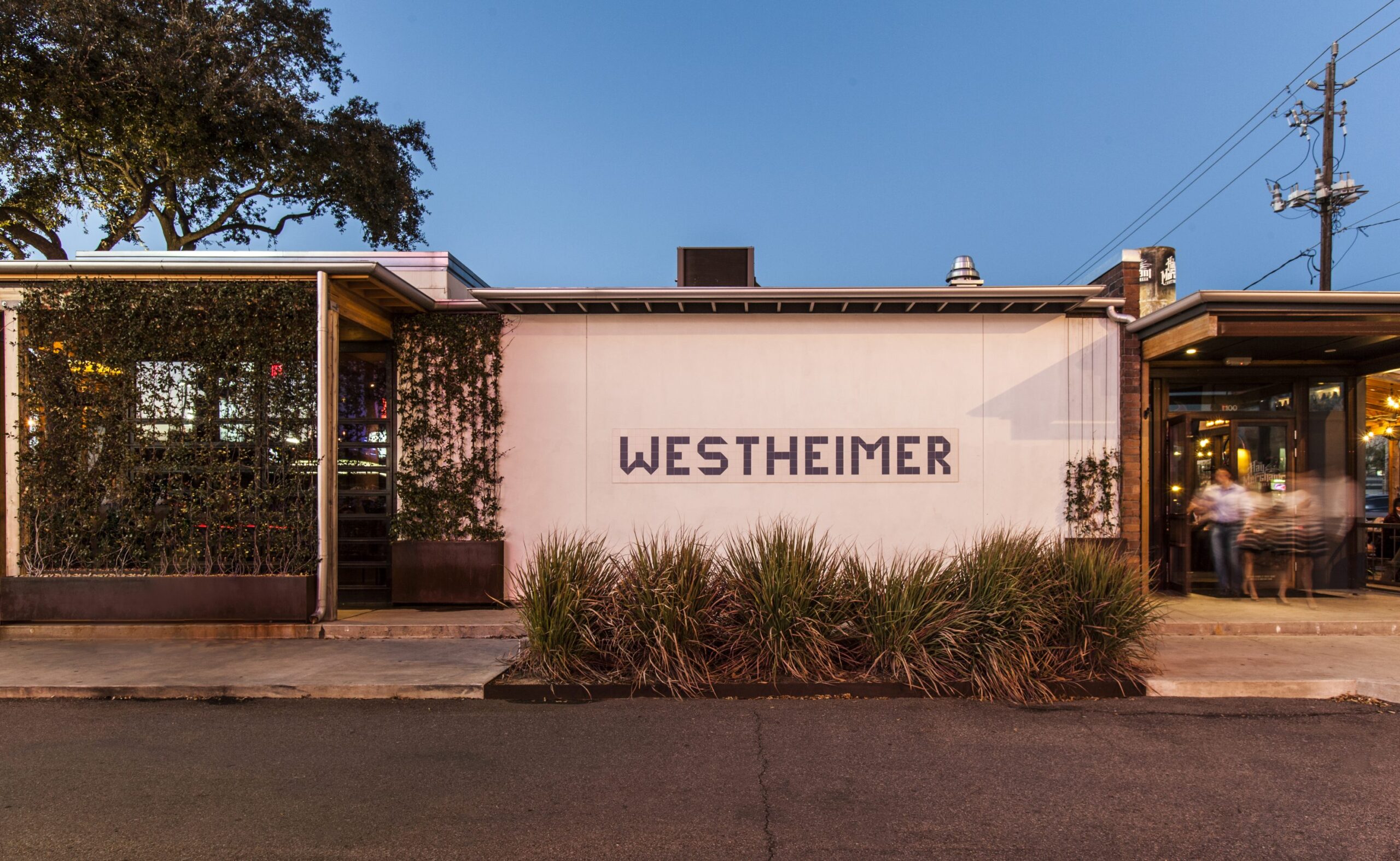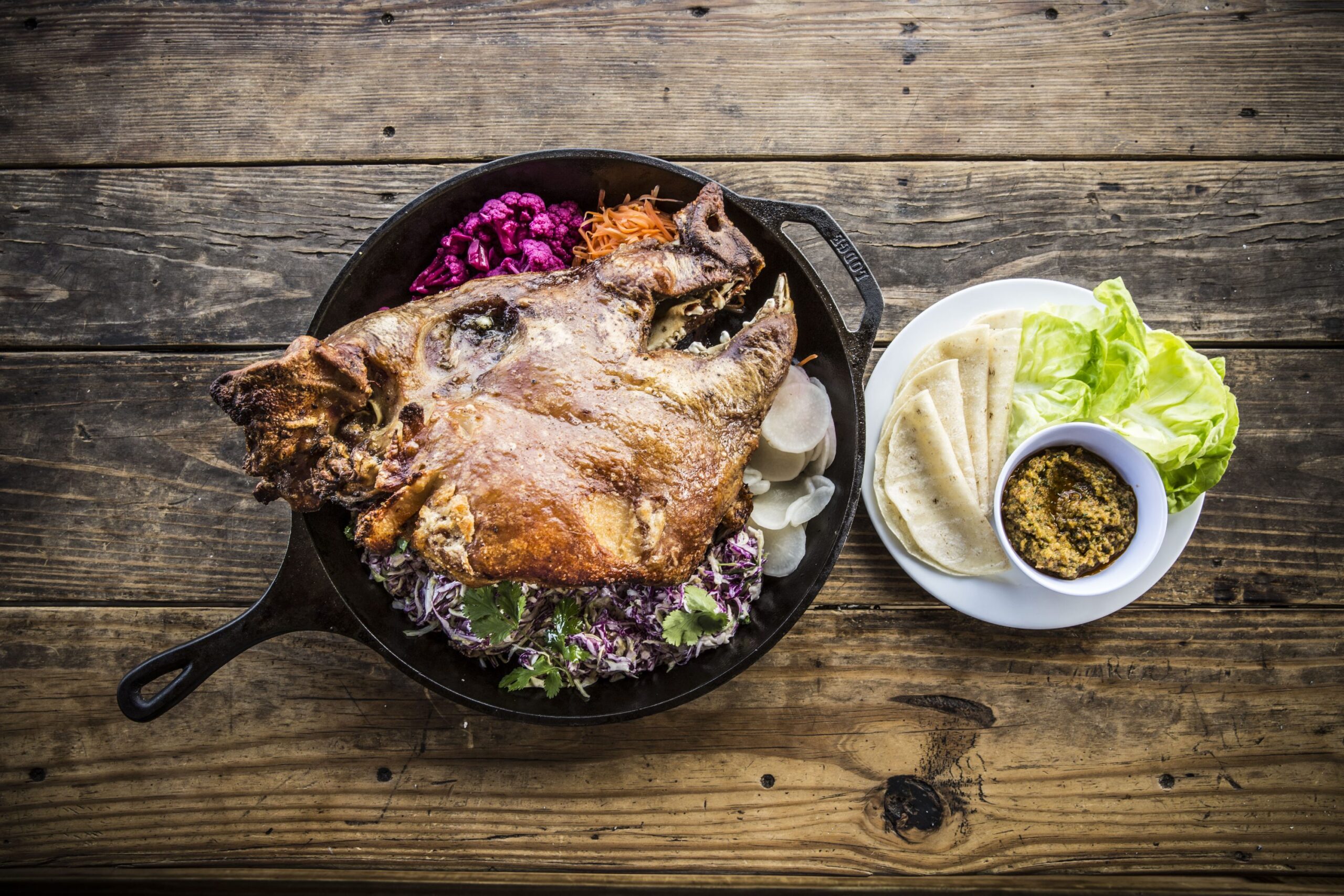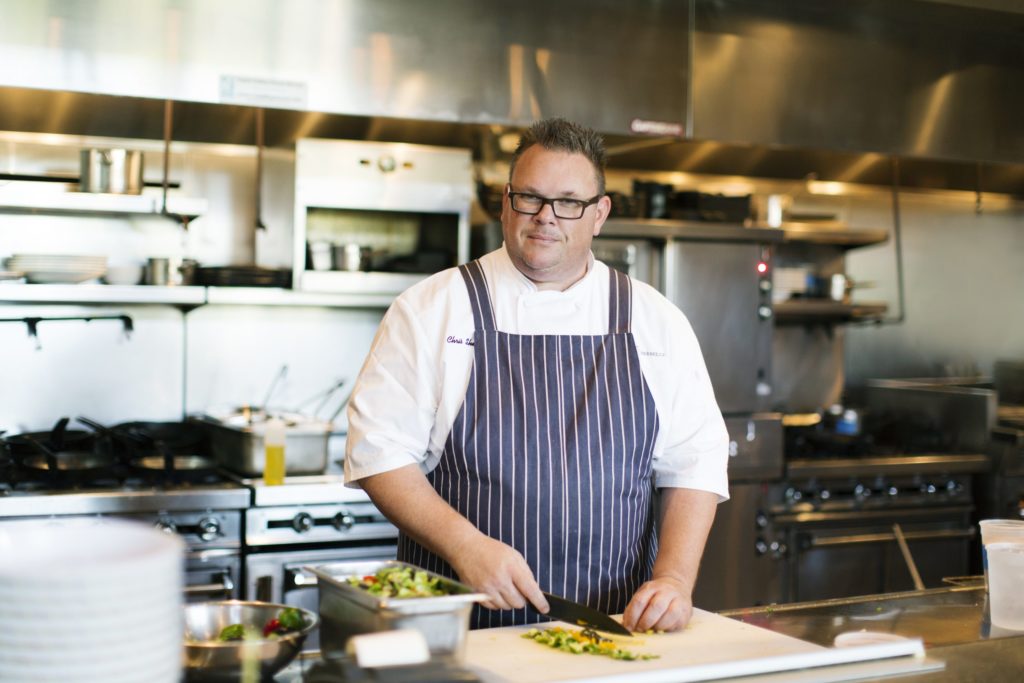Chris Shepherd Braces Himself to Close Underbelly, Start Anew: Houston’s Most Fearless Chef Tells All in This PaperCity Exclusive
BY Annie Gallay // 01.21.18Chef Chris Shepherd's Southern Smoke Foundation is benefiting from Adam Sinn's donation.
Chef Chris Shepherd’s had the time of his life at Underbelly, but now he’s gotten a new lease. Shepherd is set to say goodbye to the groundbreaking Montrose restaurant and usher in two new restaurants this spring. One will take over Underbelly’s space, and the other in its image, is slated for down the street.
“I always wanted this place to be like the gateway drug,” Shepherd says of Underbelly.
Korean braised goat and dumplings may be addictive in more ways than one. Don’t worry — that Underbelly dish will stick around. It will be served at The Hay Merchant, which will be open for lunch starting this spring.
“My thing is, if we got one table or one person to try our food and go to Mala Sichuan, go to Asia Market, go to Crawfish & Noodles — even if they went once — then we did what we’re supposed to do,” Shepherd tells PaperCity.
Now Shepherd’s been spurred to innovate himself after the success of One Fifth’s 2017 debut. The concept was a radical change from the Underbelly ethos. Five restaurants, five years, one building. Instead of different dishes daily, each eatery focuses on one cuisine, whether it be steak, the finest in France, Italy, and Spain, or next up, the Mediterranean.
Together with the revolving door of restaurants, the steakhouse Georgia James (at 1100 Westheimer) and UB Preserv, (slated for 1609 Westheimer, the site of the shuttered Jimmy Chew), mark a new era for Shepherd’s restaurants, the next stage of an evolution.
The objective stays the same: fill bellies, open minds. Satisfy your patrons and expose them to new cuisines and new cultures.
But there’s a whole new set of rules. Namely, there basically are none. It’s a paradigm shift, and a striking one. The days of ingredient restrictions and ever-changing options are behind him.
“This was my heart and soul. The thought of Underbelly — it’s more of a way of life. It’s understanding people and cultures.”
Shepherd isn’t just broadening his horizons. He’s heading into uncharted territory. Get ready for brand-new meals, meats, menus.
And modifications. He’s deviating sharply from Underbelly’s steadfast adherence to a specific culinary credo, an internal dogma about sourcing ingredients.
From the get-go, Shepherd and his staff decided to source the majority of Underbelly’s products from within 150 miles of the restaurant’s doors. This next phase shakes loose of those rigid rules but preserves the philosophy.
Since 2012, Underbelly has operated at a sprint, a flavor-filled frenzy with a constantly changing menu. “Consistently inconsistent,” is the name of the game, Shepherd has always said.
This system made for dynamic menus, cult status, and a James Beard Best Chef Southwest Award for Shepherd.
Its philosophy centers on people. Shepherd wants diners to come hungry. But he also wants them to leave hungry — hungry to learn about the food they ate, and the cultures it came from.

For over five years, devoted diners have been eating under the influence of Underbelly. Shepherd hopes they get a little taste at his restaurant, and then “figure out on their own where they need to go from there.”
In the process, Shepherd found out for himself where he needs to go from there. Underbelly was his own gateway drug, opening his eyes to possibilities like One Fifth and Underbelly’s own evolution.
He bids farewell to each One Fifth iteration in late July, but nothing compares to letting go of Underbelly.
“This was my heart and soul,” Shepherd says. “The thought of Underbelly — it’s more of a way of life. It’s understanding people and cultures.”
It’s about walking into a restaurant and not just learning how to eat the food, but understanding it and having a conversation with the person who made it, who they are and where they came from, according to Shepherd.
“To understand that we’re all flesh and blood. It doesn’t matter what race, color, creed, sex, religion,” Shepherd says. “None of that matters.”
Over time, Underbelly’s insistence on local ingredients and a moving target of a menu started to not matter so much, either. Or maybe, it mattered too much.
“I started thinking that there were too many regulations on our food. They were 100 percent self-imposed,” Shepherd admits.
The addition of One Fifth really drove this point home. “If you’re going to open other restaurants, it just isn’t feasible to keep your eye on everything,” Shepherd says.
At a certain point, “it got a little goofy,” with their whole animal policy translating to whole beef shanks on tables. “They’d almost break the table, they were so big,” Shepherd says. The massive portions were never finished at the table and often taken home. “It didn’t seem right,” he adds.
The confines boosted creativity, yielding an extremely eclectic menu. But after awhile, considering key ingredients contraband wore him down.
“What got me was coconut milk,” Shepherd says. It’s a chef’s best friend, but certainly not a locavore’s.
Going against the grain made Shepherd a little uneasy. “I felt bad about that,” he says. “I didn’t want to feel bad anymore.”
Chris Shepherd’s Surprise Steakhouse Love
The new restaurants will have a wider pool of options, but they will also maintain the thoughtfulness and careful consideration that characterized Underbelly. That means a list that’s extensive, but not all-inclusive or overkill.
At One Fifth Steak, the first of five restaurants at 1658 Westheimer, “we didn’t have 50 vodkas with 10 different styles of olives. That’s just not us,” Shepherd says. Apparently, a lack of blue-cheese stuffed olives ruffled the feathers of some picky patrons, but the chef’s not going to let that dictate what goes on the menu at Georgia James, his second steak restaurant.
It’s intriguing that Shepherd’s first experiment outside of Underbelly was a steakhouse. There are an abundance of them in Houston — and they’re not your typical example of pushing the envelope.
And If nothing else, Shepherd thinks outside the box. “I like to be thought-provoking,” he says.
Houston’s the perfect place for that attitude. “Our city grows, and it’s evolving,” Shepherd says. “There’s nothing that holds it back. And the only thing that holds you back is yourself.”
He’s not holding back with his interpretation of a steakhouse. He’s bringing something special to it: he’s bringing it home. Just like One Fifth Steak, at Georgia James you’ll be able to enjoy steak the way Shepherd personally enjoys it. The way he “eats as a cook.”
A steakhouse was a departure, but a rewarding one. “I loved it. I didn’t think I was going to,” Shepherd admits. “I usually didn’t go eat at steakhouses, with those big chunks of beef on a plate. That’s not really what I want to do.”
But he started going to them more and more with friends. He scoped out what he liked about them, and how he’d create one if he had the opportunity.
“I knew I’d want sides to be funky and fun. The seafood tower would be awesome,” he says.
The main appeal? He could make his steakhouse based on exactly what he’d cook at home for himself. “I think you got a feeling with One Fifth Steak that you’re walking into my house,” Shepherd says. “Because it’s just having no limitations on it.”
The actual “cooking of steaks” interests him. His method of choice, displayed at One Fifth Steak, will carry on over to Georgia James. All steakhouses have their own way of doing things, from seasoning, broiling, to throwing them on a grill.
“I just prefer cooking mine in cast iron,” Shepherd says. It’s no easy feat — it’s not putting 10 steaks into a broiler and watching them, he explains. “It’s physically having to sear, sear, sear. Come back with the garlic, thyme, butter and baste, baste, baste. All these pans are going at the same time.”
It’s demanding, but it’s worth it.
Getting Romantic
For its part, One Fifth Romance Languages, the upscale European edition, allows Shepherd to build on his foundation at Underbelly and One Fifth Steak. Underbelly was consistently inconsistent. “That’s fine and fun, but at some point there has to be consistency for me,” Shepherd says.
The consistency’s shown in “executed dishes. I think opening One Fifth, I realized that I like doing something over and over again. I like perfecting it and testing it, testing it, testing it,” Shepherd says.
It’s about dishes that can claim a more permanent place in a diner’s heart. That is a stark contrast from the ever-changing menu at Underbelly, which brought customers back later saying a particular dish was the best thing they’d ever had, and they wanted it again. “It was like, ‘I can’t give it to you. I’m sorry,’ ” Shepherd says.

That won’t be the case at UB Preserv, the loyal Underbelly offshoot that will open down the block. With it, Shepherd is fulfilling Underbelly’s mission on a scale he now believes the original should have had from the start. “We’re turning UB into the smaller restaurant that it should be,” he says.
In Shepherd’s mind, Underbelly “always should have been 80 seats, or 100 seats” rather than its actual 190 to 200 seats.
Like its predecessor, UB Preserv will be “fun-loving, fast-going, high-energy,” but the menu will be more focused. Expect entrees to stick around, and appetizers to linger. It’s likely they’ll keep their brainstorming technique: “walk into the cooler and let it speak to you.”
Shepherd and his staff have honed this skill at Underbelly, confronted with a fresh slate each day. The key is to let the cooler speak to you, let the combinations speak for themselves. “Don’t try to force it,” Shepherd says. “Food comes natural.”
The chef doesn’t know quite where his new projects fit into the grand scheme of things, the place they have in the changing restaurant scene. But for Shepherd, it’s never been about fitting in. “We’re going to cook what we cook, we’re going to do what we do and hope people like it,” he says. Shepherd is never going to do something just because it’s what others feel like he is supposed to.
Sometimes, customers’ favorites surprise them, like the goat and dumplings at Underbelly or the duck heart bolognese at One Fifth Romance Languages.
“There’s something comforting about bolognese, it’s good for the soul,” Shepherd says. “But you sit back and think, this is just ground duck hearts. It’s straight up ground duck hearts.” And it’s become their favorite.
Shepherd on the Houston Food Scene
Chefs in Houston are trending toward trusting their instincts, as well, according to Shepherd. The whole process of cooking what you feel like you have to is gone. “People are just doing what they want. The days of walking into a restaurant and getting a generic menu that you see everywhere — they’re not here anymore.”
Chefs are driving their own visions,. Pass and Provisions is an excellent example of that, as is Coltivare. “Seeing what Ryan (Pera) does. He cooks his food. That’s what’s fantastic,” Shepherd says. People are focusing on where they’re from, the chef adds.
Where are they from? It’s Houston — so, all over. We’re getting chefs from all over the world, and our flavor remains distinct. “You go to cities, and for a lot of them, the styles of the food and the city are very similar.” You go to Rome and it’s very Roman cuisine, it’s very Italian, Shepherd says. You go to New Orleans, and it’s fine Creole cuisine.
But “you go to Houston, it’s so broad, it can be anything. It forms and moves to everything. It’s like a jello mold of happiness,” Shepherd says. The Tulsa native adores Houston for many reasons. But as a chef, it boils down to the basics. “Fiesta kept me here,” he laughs.
His staff is dedicated to Underbelly, and all of Shepherd’s restaurants. He isn’t going anywhere, and neither are they. It’s a time of transition, and they’re put in a position to try to figure out what they want to do next. Do they want to work at One Fifth, UB, Georgia James? One thing’s for certain: much of the staff knows they want to stay with Shepherd.
“It’s really awesome when your staff knows that they don’t know what they want to do, but they want to be part of everything,” he says.
So, what happens next? Some restaurants will close, others will open. Once the five-year lease is up at One Fifth, nothing’s set in stone for the future of those concepts. “I’ve got no idea,” Shepherd says. “No clue.”
Shepherd is keeping things open-ended. For him, food is what connects people, and it’s what counts. How he chooses to make his food has always been his decision, and he’s owning that more than ever.
Will he have a steakhouse?
“Yes,” he says. “Will I throw some coconut milk in it?” He laughs. “You never know.”



















































